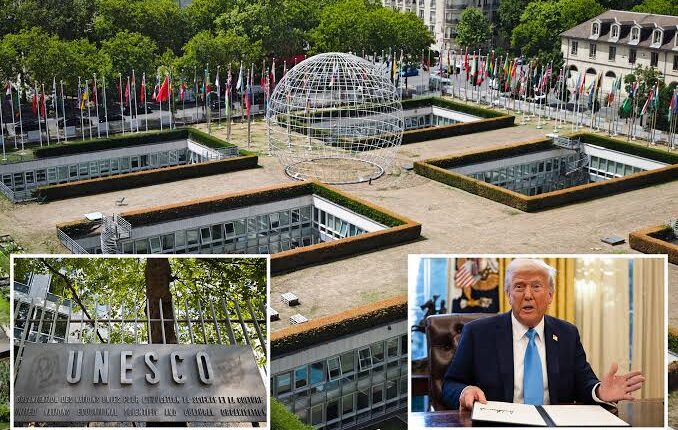US to Withdraw from UNESCO Again, Citing Anti-Israel Bias
The Trump administration announced Tuesday that the United States will once again withdraw from the United Nations Educational, Scientific and Cultural Organization (UNESCO), marking a renewed retreat from international cooperation just two years after rejoining the agency.
The move revives a long-standing dispute between the US and the Paris-based body, with the White House citing what it calls UNESCO’s “divisive agenda” and continued “anti-Israel bias” as key reasons for the exit. The decision will officially take effect in December 2026.
This marks the second US withdrawal from UNESCO in less than a decade. The Biden administration had rejoined in 2023, after the initial pullout during Trump’s first term in 2018. Before that, the Reagan administration exited the agency in 1984, only for the US to rejoin under President George W. Bush in 2003.
State Department spokesperson Tammy Bruce said UNESCO’s 2011 admission of “the State of Palestine” as a full member remained a major sticking point. “It’s contrary to US policy and has contributed to the proliferation of anti-Israel rhetoric,” she stated.
The latest exit is part of Trump’s broader “America First” approach, which has seen the US also withdraw from the World Health Organization and the UN Human Rights Council, as well as reassess funding for several other global institutions.
UNESCO Director-General Audrey Azoulay expressed regret but noted the decision was not unexpected. “We deeply regret the withdrawal, but we are prepared for it,” she said.
Azoulay rejected claims of anti-Israel bias, pointing to the agency’s work on Holocaust education and combating antisemitism. “The reality of UNESCO’s efforts stands in contrast to the accusations,” she said, adding that “political tensions have eased” and the agency remains “a rare forum for consensus.”
Despite the loss of US contributions — currently 8% of the agency’s total budget — Azoulay said UNESCO would continue its mission without staff layoffs and pledged to strengthen ties with American civil society, academia, and nonprofit organizations.
France, where UNESCO is headquartered, also lamented the US move. The French Foreign Ministry described UNESCO as vital to global peacebuilding and condemned the decision as a step back from promoting education, cultural protection, and responsible use of technologies like AI.
Israel welcomed the US withdrawal. “This is a fitting response to UNESCO’s consistent anti-Israel bias,” said Danny Danon, Israel’s ambassador to the UN.
But critics warned the decision weakens US global leadership and hands influence to geopolitical rivals.
“Unilaterally withdrawing the US from UNESCO is another assault by the Trump administration on international cooperation,” said Rep. Gregory Meeks, the top Democrat on the House Foreign Affairs Committee. “This cedes ground to China and other competitors who will shape the international system in our absence.”
The Biden administration had previously argued that rejoining UNESCO was necessary to counter China’s growing influence in global standards-setting, particularly in areas like artificial intelligence and tech education.
UNESCO, founded in 1946, is best known for its World Heritage Sites program and initiatives that promote global cooperation through education, science, and culture. Despite reduced US support, the agency says its core mission will remain unchanged.



[…] the statement read. “He was with his family and surrounded by love. We ask everyone to respect our family’s privacy at this […]